Note to Readers:
This narrative is quite long, like the cross country train ride where it begins. Mostly it’s just my story, augmented by a few reflections about Ukraine’s political and historical reality. Yet it’s a hefty enough chunk of writing that it warrants context. I’d like to mention two points.
First, in editing this essay down to a reasonable length,* I realized that a vital part of citizen diplomacy is actually knowing some things about the place you are visiting. In my past life, leading and coordinating groups of teenagers traveling overseas, I always sought to give students enough information about the host country to be competent travelers. This is harder to do as an independent traveler. So if this narrative seems long (it is), that’s intentional.
Second, my knowledge was deeply enriched by my alliance with Kateryna Yasko, her partner Vytas Bicunias, and their friends, especially Valerii Pekar. Together they helped me go well beyond the superficial to experience far more of Ukraine in a week than would normally be possible. Further, they generously hosted me in their home, coordinated much of my travel, and provided rich perspective in our extensive and wonderful conversations. My gratitude to them knows no bounds.
(* I did opt to break it up into several manageable episodes. Subscribe to be notified of future posts!)
4 June 2025
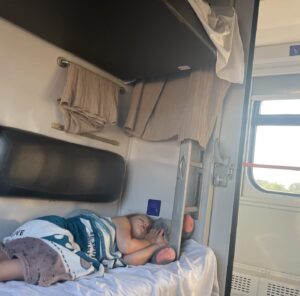
My cabin-mate’s young daughter sleeps.
I boarded the train in Budapest and sweated in the still heat of the cabin awaiting departure.
My first taste of Ukraine came from a simple question I asked the woman across from me. This person – who is likely not yet 30, speaks a little English, and is traveling with her kids – whether she was going home or heading out on a trip. It was the kind of conversation starter you might ask a seatmate on an airplane.
The young woman burst into tears at my question. Composing herself, she explained that she was living in Spain with her family, but that Kyiv was her home. Now she was taking her kids to visit her parents, their first visit in a year. I was curious about her husband but recognizing the traumas of wartime, it didn’t feel right to ask.
At that point were both distracted by her rambunctious four-year-old. But I realized that I was now face to face with a war that’s previously been an abstraction. And still in the middle of Budapest.
5 June 2025
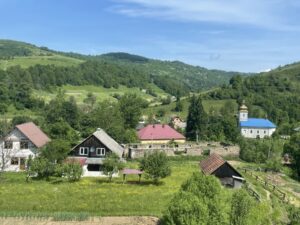
We passed through many rustic villages like this one.
At dawn we entered Ukraine.
After a river crossing, we stopped in the town of Chop. A border guard came through the train, and rather than glancing at our passports, collected them. It’s unsettling when your passport walks away in the hands of a uniformed person. It’s more unsettling when the train starts moving again without your passport being returned. But after much back-and-forth and changing of train cars, our passports were returned and we continued.
By midmorning we left the flatlands and entered foothills: the Eastern Carpathian Mountains. Indeed, the last town we passed was called Karpaty. The train is following the Latorica River upstream into the hills.
I’ve enjoyed interacting with the lass in my compartment. She’s young and quite small; it’s a hard to see her as a mother of four. Her kids are blond and beautiful. The older two – a girl of eleven and a boy of eight – pop into our cabin occasionally. They show signs of good parenting: polite, respectful of each other, playful but settled.
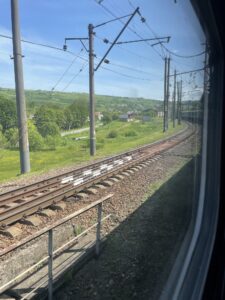
Electric infrastructure makes this train quiet and clean.
In any case, hearing me cough, she offered me a menthol cough drop. I gratefully accepted and managed my first successful expression in Ukrainian: “Dyakuyu.” She smiled at my functional if imperfect use of her tongue. I want to ask about her family, her life, and her country, but English seems difficult for her and I have no Ukrainian.
The countryside, villages and mountains are beautiful. We pass through a couple of short tunnels ascending a narrow valley. The third tunnel is much longer, maybe a kilometer, which leaves us in a high basin, between steep slopes of mixed conifers and deciduous trees. The river now flows with us as we trend northward. There are signs of logging, and one village has a sawmill. The houses are modest but functional. It’s hard to believe that this is a country at war.
There are few cars; most houses have zero or one, and I’ve not seen any gas stations, parking lots, or mini marts. Numerous solar panels give the pastoral landscape a taste of the 21st Century. What stands out most are the vegetable gardens next to every house. Do these reflect pursuit of food sovereignty? Economic frugality? Health concerns? Or perhaps just a culture not too obsessed with electronica to cultivate the earth.
Did culture as we know it not co-arise with agriculture?
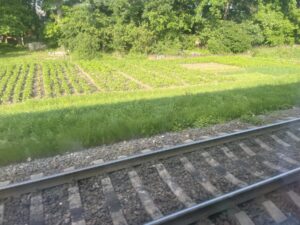
Hand-tool agriculture seems omnipresent in Ukraine.
Faith is visible. Every village has a prominent, often even gleaming, church at its center. Most sport onion domes in what I think of as a Slavic? Soviet? Islamic? tradition. But they also display crosses, and the gleam comes from the gilt paint that many of them feature. My assumption is that they are Ukrainian Orthodox.
After we passed Lviv, the land became flat and stayed flat. This journey crosses the great plains of Ukraine. This reminds me that Ukraine is seen as the “breadbasket of Europe.” It’s hard to identify individual crops, but we passed hundreds of kilometers of croplands. Again, there is no evidence that this country is at war. I saw a single uniformed soldier near the train tracks, but that’s less military presence than you might find at the door of any Guatemalan bank.
My cabin-mate’s name is Yvgainya. She asked me if I was scared to be going to Kyiv. I said no, and returned the question. Yes; she and her family left the city with her family after a missile landed near a bus she was riding. Aside from my host Kateryna, Yvgainya’s is only the second opinion I’ve heard about the risks in Kyiv from someone who has lived there. But Yvgainya left and Kateryna stayed. And Yvgainya has largely been away. Age may also be a factor; Yvgainya is 5-10 years younger than Kateryna, so her kids are younger too.
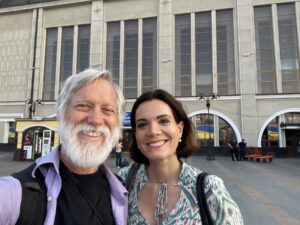
Katya and Daniel meet in person at last.
I’ve mentioned the ubiquity of vegetable gardens. Some gardens sit within 5-10 meters of the railway tracks. At first it seemed incongruous: Food production (tender, healthy) abutting transportation infrastructure (loud, toxic). But then I recalled that these are electric trains (quiet, nontoxic). Having invested in clean infrastructure to carry freight and people, Ukraine keeps more land suitable for producing life. Such foresight seems uncommon in my society.
Eventually we reached Kyiv. I threaded my way out to the terminal’s street entrance. Being outside after 22 hours in a small cabin was a delight. The evening air was mild, and surprisingly fresh for a city center. The setting sun washed everything with a pervading brightness. Soon, Kateryna arrived and greeted me warmly: After six months of meeting online, we finally embraced. Katya pointed out a skyscraper that had visible broken windows from the shock waves of a missile, but I easily could have missed it. Otherwise everything seemed normal.
We reached Katya’s building and boarded the elevator. She pushed the button for the top floor: the penthouse! The place was amazing. Even coming from the richest country on earth, I’d never seen a more elegant apartment. It has teak flooring and an oak spiral staircase up to a rec room with a full wall of windows. The breakfast nook had an incredible 30 mile view out over the river, parks, bridges, & city. There were curved walls, abundant space, elegant furnishings, and shelves full of books in both Ukrainian and English. Wow.
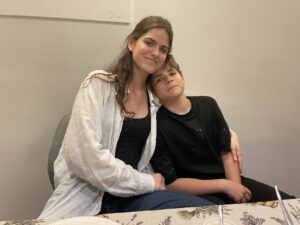
Anna and Petras, Kateryna & Vitas’ kids.
We sat down to our first dinner together, a simple, elegant, and nutritious meal prepared by Anna, Katya’s daughter. Dining with Katya and her family opened a lovely connection that had previously been electronically mediated. Since my train arrived late, we didn’t finish the meal until nearly ten. I was exhausted, and happily headed for the guest bedroom to sleep.
6 June 2025
Sleep proved brief.
A few hours after reaching Kyiv I awoke to the sound of air raids. The family gathered up some things and we headed down the elevator and across a courtyard to the parking garage. Entering, we heard explosions. My key experience was awe, yet I understand that my perspective reflects privilege: My children are no longer dependent, none of my loved ones are war casualties, and my home and neighborhood aren’t at risk.
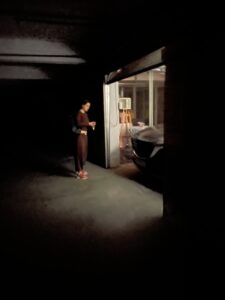
The parking garage is left dark to save electricity.
We paused at the entrance to the parking garage. Katya’s daughter suggested (it was very quiet) that we hold up and observe. We stayed for a bit in anticipatory silence, alternating between looking up into darkness and down at a missile tracking app. More explosions, loud, close, and ominous, like lethal thunder. We went inside to sit in their car.
Anticipatory silence. This is how Quakers spend worship time. It means being receptive and reverent in the sphere of sacred power, welcoming what may arise. This was a different sort of anticipatory silence. We await word of destruction, not word of sacred wisdom.
Tonight’s barrage is not incidental. Just a few days earlier Ukrainian drones destroyed numerous Russian warplanes in the covert and highly successful “Operation Spiderweb.” While it took out a large chunk of Russia’s offensive fleet, it predictably lit a fuse on retaliatory action. I happened to be there during the backlash.
Checking her app, Katya indicated that the entire country was on high alert, and the explosions we heard were drones being intercepted above the city. There was discussion about why so few residents in their apartment complex were sheltering with us. Some, apparently, don’t have cars and thus lack access to the parking garage. Some have cars and drove out of town, though that’s a curfew violation. I learned that while an intercepted drone doesn’t cause direct damage, debris still showers down dangerously when it’s intercepted.
We stayed put in the shelter. But the silence, anticipation, and latency had an angular uncomfortable quality, like sitting on rocks that are tolerable for a short time, but then are not. Only this sitting feels surreal. It’s not stone causing bodily discomfort but psychic angularity – shapeless, pointed and insensate, without a tactile referent to ground it in reality.
More explosions. Some are loud enough and close enough to trigger car alarms. Katya checks her phone frequently in an inversion of the preoccupation many people have with their phones: Here, the screen doesn’t feed a hunger for stimulation, but the need to know facts with life and death implications.
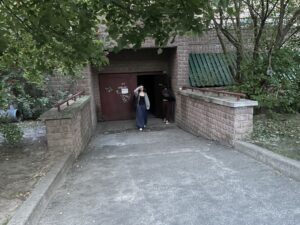
Groggily, we left the parking garage at dawn.
We’re not the only ones in the parking garage taking refuge in cars. I realize this at the sound of a car door slamming. That noise can have a big emotional impact when one’s nervous system is hyperactivated. I don’t have many reference points for this feeling. It was as if the stress simulation techniques I use with Aikido workshop participants had resurfaced as a real threat for me to face and make peace with.
I was awoken. “Daniel, we are going back now.” I can’t quite believe I slept, sitting upright in a car. I must have been beyond tired. We groggily return to the apartment, where I fall asleep right away, for another couple hours. Afterward, the whole thing seems surreal, out of a dream. But I replay the story – the sirens, the explosions, the car alarms, the dogs barking. And my somatic being echoes with being hustled from bed and into a bomb shelter, while tracking Telegram reports of the attack.
The outcome? Far less awful than expected, in retaliation for the success of the destruction of so many of Russia’s warplanes last weekend. Four hundred drones attacked, all across the country. Most shot down. Forty missiles. Most shot down. A few dozen injuries and just three fatalities, all military. And numerous buildings damaged. In Kyiv, limited damage because here the air defenses are most sophisticated and extensive. The next day, Petras (Katya’s 11 year old son) grumpily had to go to school since the raid wasn’t extensive enough for schools to close.
What a life for an 11 year old! Waiting to hear if school has been closed, not because of snowfalll but because perhaps your school has been turned to rubble?
And such stark contrast: Here, a pleasant, even elegant, settled life in a beautiful Kyiv apartment. And here also:the ugly threat of an unprovoked war.
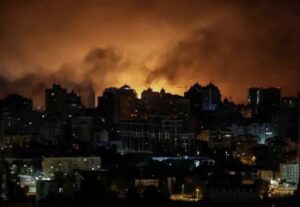
What night attacks can look like. (I didn’t witness anything like this.) Lesia Kostiuchenko photo
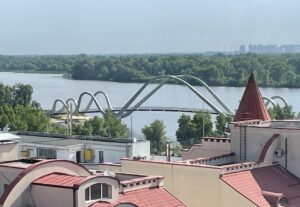
The Dnipro River arcs through Kyiv, with an unusual bridge visible from Katya and Vitas’ apartment.

Already, your your train ride and the first night have had a great impact, on me at least.
Thanks, Barbara. I’m still very much feeling the impact two months afterward. Anytime I hear anything that sounds like a drone, my nervous system goes into override. One can only imagine what it is like to live under unprovoked and imminent threat for years on end.
I’m moved by the dignity of the Ukrainian people within such chaos and violence. Thank you for sharing. May there be an end to senseless killing and land theft globally
Indeed, Lindsey. I’m with you. One of the hardest things for me about this trip was confronting a violence that as a pacifist and Quaker I have never before faced. And seeing those who courageously face it daily? Very moving. Hopefully moving to all of us, in the direction of working to end it.
I was in Kiev in the 5th week of the war, to help. I have both a Quaker and a Marine (war vet) background. I was involved with senior Ukrainians while there. My impression of the Ukrainians was extremely high even though my wife and many friends were Russian and I had worked there a bit. Ukrainians have proved adaptable, massively intelligent and crafty. Under Zelenskyy and their more modern, more democratic, more open, more European, and less autocratic government, Ukraine came together and are showing their stuff. Trump is loosing the war thru his weakness and his stupidity. It makes me more ashamed than ever before about MY US. It scares me that a democracy can elect such a man – and hope that we can recover.
Thanks, Dennis, for this reflection. The question we all face — all of us under the US regime, that is — is how to metabolize that shame into meaningful action. I will try and address this question more fully in a future post. I absolutely underscore your perspective on Ukrainians being adaptable, intelligent, and crafty. I would add gracious, determined, and resilient, though perhaps those qualities are ones I’ve already spoken to.